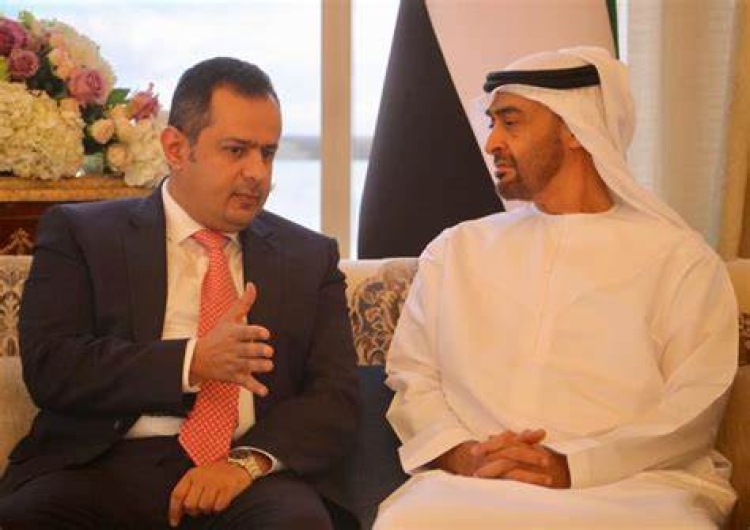SANAA, June 16 (YPA) – The UAE was not satisfied only to send its ambassador, Mohammed Al Zaabi, to hold a meeting with the head of the coalition-backed government, Maeen Abdul-Malik, but rather it reinforced that with a phone call from Vice President Mansour bin Zayed, on Wednesday.
In a report made by Yemen Press Agency, observers has considered the Emiratis’ rally around Maeen Abdul-Malik, in this critical circumstance that Maeen is going through, came after the escalation of demands for his removal against the backdrop of the economic collapse crisis, which indicates that the UAE has not yet found a replacement for Maeen in heading the “government”.
Political analysts believed that the conflict between Riyadh and Abu Dhabi to control the areas of southern and eastern Yemen may push the economic situation in the country towards further escalation. Where the leaks indicate that Saudi Arabia seeking to bring about a complete change in the entity of the leadership council loyal to the coalition in Yemen, a step that Abu Dhabi opposes, for fear that the change of Maeen Abdul Malik will open the doors to replacing the Saudi-formed “Presidential Leadership Council” that the UAE acquired most of its members, after Al-Muharrami and Al-Bahsani loyal to the UAE became members of the UAE-backed Southern Transitional Council (STC), which led to the overthrow of the balancing structure on the basis of which the “Presidential Council” was formed.
Although Riyadh believed, during the last period, that Maeen Abdul-Malik was showing inclinations in favor of Abu Dhabi, the Saudis retained their positions towards him, especially Riyadh was adhering to a policy of appeasement and not opposing the UAE’s directions in the coalition-held areas of Yemen, before Riyadh was forced, since last October, to take sharper positions on the issue of Abu Dhabi’s monopoly in administering the coalition-controlled areas in Yemen.
Observers think that the conflict between Saudi Arabia and the UAE will not be reflected in any way on the competition to provide the best and support the economy in southern Yemen, where it seems, from the point of view of some, that Abu Dhabi and Riyadh have agreed on the “principle” of poor Yemen, which is confined to crises, and any directions to help the Yemenis may lead to setting the agendas of Saudi Arabia and the UAE to dominate the country in front of challenges that can be dispensed with by plunging Yemen into crises.
Although Riyadh and Abu Dhabi had promised to provide a financial grant to the government loyal to the coalition at a value of three billion dollars, during the exclusion of exiled president Hadi and the installation of the “leadership council” in April last year, these promises have not been implemented on the ground, as part of what some considered a “policy of impoverishment and starvation and deliberately made by the Saudis and Emiratis against Yemen.


